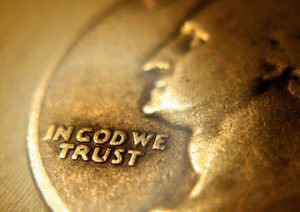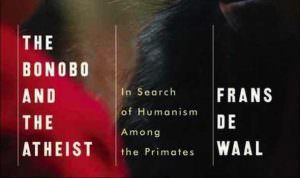Render Unto Darwin That Which Is Darwin’s
The New Atheist writers from Richard Dawkins to E.O. Wilson to Sam Harris have become the high priests not of science but the cult of science.
The German chemist August Kekulé fell asleep in his study after a fruitless struggle to identify the chemical structure of benzene. He dreamed of a snake eating its own tail and awoke instantly. The dream gave him, through the ancient language of symbolism, the circular structure of the benzene ring that had eluded his conscious mind. The dream may have had its basis in Kekulé’s experiments, but it was the nonrational that brought him his discovery.
Many physicists see “string theory” — in which the structure of the universe is made up of resonating, one-dimensional submicroscopic strings — as plausible. Yet no scientist has ever seen a string. No direct experimentation has established a firm ground for strings. Cosmology routinely bases arguments on things that cannot be seen in order to explain things that can, as in the case of “dark matter,” whose effects can be seen. Quantum physics demolished the assumption that physical elements are governed by fixed laws.
Science is often as inexact and intuitive as theology, philosophy and every other human endeavor. A mirror demonstrates the randomness of nature. A mirror reflects about 95 percent of light hitting it. The other 5 percent passes through the mirror. Photons, which are invisible, are either reflected or pass through the mirror’s surface. But there is no way of knowing which photons will be reflected and which will be absorbed. Electrons are also subject to these quantum effects. This led Werner Heisenberg to formulate his “uncertainty principle.” This principle states that we cannot know everything about a particle. If we can determine a particle’s position we cannot determine its momentum. We can measure momentum, but in this measurement we lose the particle’s exact position. We can know a particle’s momentum or its position. We cannot know both with definitive accuracy.
Science is not always directly empirical. Science is not governed by absolute, immutable laws. Science, and especially quantum mechanics, far from telling us we can know everything, tells us there will always be things we cannot know. No one ultimately understands. Science affirms the complexity and mystery of the universe. Science, like the religious impulse, opens us up to a world where we face mystery. There are forces in the universe that will always lie beyond the capacity of the human mind.
The New Atheist writers from Richard Dawkins to E.O. Wilson to Sam Harris have become the high priests not of science but the cult of science. Dawkins, Daniel Dennett and Susan Blackmore, for example, call religious beliefs “memes.” Memes are defined as cultural artifacts — prototypical ideas — that invade and restructure minds in order to reproduce themselves. A meme replicates in human minds, they argue, the way genes replicate in human bodies. Memes include a word, belief, thought, religious ritual, dance, poem or any of the myriad of behaviors that are copied and reproduced in human societies. Although memes, unlike genes, are not identifiable physical structures, Dawkins uses the image of a virus to describe them. Religion, for Dawkins, is equated with a disease, and the religiously inclined are disease carriers.
The attempt to equate patterns of human society with the behavior of genes, while it sounds plausible, and may even be instructive in some settings, is part of this cult of science. The genetic coding that permits the transfer of DNA-encoded units of information is fairly precise. But this model fails to work for the transfer of cultural, social, ethical and political behavior. Patterns of morality are easily reversed or erased, especially in ages of revolutionary fervor, war, anarchy, fear, social decline and despotism. Those who are schooled in identical religious texts, even within the same communities, have different views of morality and ethics. It is possible to transfer literal meaning. It is possible to transfer genetic information. It is possible to pass on heritable characteristics mediated by hard-and-fast rules of chemistry and physics. These rules, however, have no counterpart in the dissemination of ideas. Ideas do not replicate like genes. Ideas are snuffed out or forgotten, often for centuries. Ideas that prevail are often not the best ideas but more often ideas backed by power. The rise of Christianity owed more to the brutality of Constantine and the Holy Roman Empire than it did its particular theology. Those who advocate the theory of memes ignore the role of power, repression, persecution and force in human history, as well as the inherent chaos and irrationality of human thought. Human thought cannot be treated like an object in a laboratory. There is no scientific mechanism that explains cultural evolution.
Those who endorse the meme theory speak of memetic engineering. This memetic engineering would involve the conscious manipulation of intellectual evolution by disseminating good memes and curtailing bad ones. The question of who decides which memes are good and which bad is not raised. Dennett has argued that human evolution can be shaped and directed through memetic engineering. He advocates not science but indoctrination, an updated version of thought control. The theory of memes and memetic engineering, like the idea of the new man, is another form of magical thinking. It is not real. It has no more scientific validity than Intelligent Design. And, should it ever be adopted it would result in anti-intellectualism, a war on science and democratic freedom and a silencing of those who fail to conform. The world the high priests of memetic engineering propose is as repugnant as the fundamentalist utopia advocated by the radical Christian right.
Einstein’s quest for a unified field theory explaining subatomic structure or the Big Bang no more undermined religious contemplation than evolutionary biology. The questions of science are not the questions of religion. Science does not attempt to address, nor is it capable of addressing, the final mystery of existence, our moments of transcendence, the moral life, love, our search for meaning and our mortality. Science, limited to what can be proved and disproved, is a morally neutral discipline. It serves human needs and human ambitions. There are times when it protects and advances life. There are times when it empowers ambitions that are immoral and deadly. Science, like all human endeavors, comes with good and bad, possibilities of hope and possibilities of destruction. When Darwin published “On the Origin of Species by Means of Natural Selection, or the Preservation of Favored Races in the Struggle for Life” in 1859, he named natural selection as the mechanism that drives and defines life. Evolutionary science, however, swiftly became for many a surrogate religion. It was used to promote racism and pseudo-science, such as eugenics, a theory of biological determinism invented by Francis Galton, Darwin’s cousin. It was turned like a club on religion and used to justify exploitation and neglect of the poor and disadvantaged.
There are unfortunate implications in Darwin’s theory of evolution. Darwin believes in the possibility of compassion and benevolence. He argues that these adaptations give one species advantage over another. He uses compassion to insist that sooner or later the “superior” races — those with compassion — will exterminate the “more savage” races. Compassion, he implies, does not exist, or certainly not in the same abundance, in others as it does in us. But Darwin left the championing of these implications to others such as Herbert Spencer, a utopian and a doctrinaire Malthusian. It was Spencer, not Darwin, who argued that step by step we were progressing as a species and would end with the perfect human being. And it was Spencer who coined the phrase “survival of the fittest.”
The atheists, while they do not endorse the hierarchy of races or espouse the crude racist doctrines of earlier Social Darwinists, continue to argue that natural selection is social selection. They continue to create moral hierarchies among human beings and use these hierarchies to sanction violence. They do this because they insist we are moving toward a final good. This is not a position supported by human history, human nature or evolutionary biology.
Wilson, in his book “On Human Nature,” uses evolutionary biology to justify power structures such as the subjugation of women and social inequality. All behavior in society, he argues, has a genetic basis. Religious belief exists, he writes, only because it gives humans a biological advantage. Religion helps “congeal identity,” provides “unquestioned membership in a group claiming great powers” and gives to a human being “a driving purpose in life compatible with his self-interest.” Wilson, while correct in assuming that many of the laws that govern animals also govern the behavior and habits of the human species, goes much further. He leaps from science to the unscientific propositions that evolution means we can, as a species, morally advance. He dreams of a day when the human race, having jettisoned religion and embraced science and reason, will be able to alter human nature and control its own destiny:
“… [G]enetic evolution is about to become conscious and volitional, and usher in a new epoch in the history of life. … The prospect of this ‘volitional evolution’ — a species deciding what to do about its own heredity — will present the most profound intellectual and ethical choices humanity ever faced … humanity will be positioned godlike to take control of its own ultimate fate. It can, if it chooses, alter not just the anatomy and intelligence of the species but also the emotions and creative drive that compose the very core of human nature.”
Dawkins writes that the human species, unlike other animals, can transcend its biological map. “We are built as gene machines and cultured as meme machines, but we have the power to turn against our creators. We, alone on earth, can rebel against the tyranny of the selfish replicators,” he says.
This leap by Wilson and Dawkins is not science. It certainly is not Darwinian science. Darwin wrote nothing to indicate that the human species had risen above its biological composition. He argued that human morality was linked to the behavior of animals. The social instincts that constitute humankind’s understanding of moral behavior can be found, he wrote, in monkeys, pelicans and dogs, as well as other animals.
Wilson and Dawkins build their vision of human perfectibility out of the legitimate theory that human beings are shaped by the laws of heredity and natural selection. They depart from this position when they assert that we can leave that determinism behind. There is nothing in science that implies that our genetic makeup allows us to perfect ourselves. Those who, in the name of science, claim that we can overcome our imperfect human nature make a leap of faith. In this leap they leave the realm of science. They operate on a belief system that functions like religion. It gives meaning. It gives purpose and hope. But it is a myth. It is not true. And there is nothing, when you cut through their scientific jargon, which supports their absurd proposition.
The attempt to impose the methodology of science onto collective and personal relationships also has grave consequences. If a scientific hypothesis does not work it is discarded. Pluralism has no place in science. Neither do competing truths. Science, when set up as a model for our moral and social existence, implicitly banishes compromise and tolerance. Scientific ideas, because they can be demonstrated or disproved, are embraced or rejected on quantifiable evidence. But human relationships and social organizations interact and function effectively when they are not rigid, accept morally ambiguity and take into account the irrational. Politics, for example, is about channeling and managing human drives and desires. It is only fitfully in contact with reason. This profound understanding of the irrational element in politics led Sigmund Freud to write his masterpiece “Civilization and Its Discontents.” The secular fundamentalists, in a gross misuse of Darwin and of science, turn biological evolution into a methodology to champion moral progress for the human race. They seek to give to their arguments the patina of unassailable truth. But what they sell are myths, bizarre utopian visions of a new heaven and a new earth dressed up in the language of scientific rationalism.
Chris Hedges, who graduated from Harvard Divinity School, is the author of “I Don’t Believe in Atheists.”
Your support matters…Independent journalism is under threat and overshadowed by heavily funded mainstream media.
You can help level the playing field. Become a member.
Your tax-deductible contribution keeps us digging beneath the headlines to give you thought-provoking, investigative reporting and analysis that unearths what's really happening- without compromise.
Give today to support our courageous, independent journalists.





You need to be a supporter to comment.
There are currently no responses to this article.
Be the first to respond.